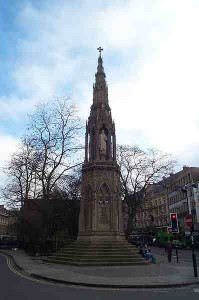
On 16 October 1555, during the reign of Mary I, Protestants Hugh Latimer and Nicholas Ridley were burned at the stake in Oxford. Along with Archbishop Thomas Cranmer, they have become known as the Oxford Martyrs and the site of their executions is marked by a stone monument: Martyr’s Memorial.
Both men were influential Protestants. Latimer, the former Bishop of Worcester, had served Queen Anne Boleyn as one of her chaplains and had been court preacher during the reign of Edward VI. Ridley had served as a chaplain to Archbishop Thomas Cranmer and had been appointed Bishop of London during Edward VI’s reign. Ridley had made himself rather unpopular with Mary when he supported Lady Jane Grey’s claim to the throne and preached a sermon at St Paul’s Cross on 9th July 1553 proclaiming that Mary and Elizabeth were both bastards.
Martyrologist John Foxe described the burnings of Latimer and Ridley in his Book of Martyrs:
“Dr. Ridley, the night before execution, was very facetious, had himself shaved, and called his supper a marriage feast; he remarked upon seeing Mrs. Irish (the keeper’s wife) weep, “though my breakfast will be somewhat sharp, my supper will be more pleasant and sweet.”
The place of death was on the north side of the town opposite Baliol College:—Dr. Ridley was dressed in a black gown furred, and Mr. Latimer had a long shroud on, hanging down to his feet. Dr. Ridley, as he passed Bocardo, looked up to see Dr. Cranmer, but the latter was then engaged in disputation with a friar.—When they came to the stake, Dr. Ridley embraced Latimer fervently, and bid him be of good heart. He then knelt by the stake, and after earnestly praying together, they had a short private conversation. Dr. Smith then preached a short sermon against the martyrs, who would have answered him, but were prevented by Dr. Marshal, the vice-chancellor. Dr. Ridley then took off his gown and tippet, and gave them to his brother-in-law, Mr. Shipside. He gave away also many trifles to his weeping friends, and the populace were anxious to get even a fragment of his garments. Mr. Latimer gave nothing, and from the poverty of his garb, was soon stripped to his shroud, and stood venerable and erect, fearless of death.
Dr. Ridley being unclothed to his shirt, the smith placed an iron chain about their waists, and Dr. Ridley bid him fasten it securely; his brother having tied a bag of gunpowder about his neck, gave some also to Mr. Latimer. Dr. Ridley then requested of Lord Williams, of Fame, to advocate with the queen the cause of some poor men to whom he had, when bishop, granted leases, but which the present bishop refused to confirm. A lighted fa*ot was now laid at Dr. Ridley’s feet, which caused Mr. Latimer to say, “Be of good cheer, Ridley; and play the man. We shall this day, by God’s grace, light up such a candle in England, as, I trust, will never be put out.” When Dr. Ridley saw the flame approaching him, he exclaimed, “Into thy hands, O Lord, I commend my spirit!” and repeated often, “Lord receive my spirit!” Mr. Latimer, too, ceased not to say, “O Father of heaven receive my soul!” Embracing the flame, he bathed his hands in it, and soon died, apparently with little pain; but Dr. Ridley, by the ill-adjustment of the fa*ots, which were green, and placed too high above the furze was burnt much downwards. At this time, piteously entreating for more fire to come to him, his brother-in-law imprudently heaped the fa*ots up over him, which caused the fire more fiercely to burn his limbs, whence he literally leaped up and down under the fa*ots, exclaiming that he could not burn; indeed, his dreadful extremity was but too plain, for after his legs were quite consumed, he showed his body and shirt unsinged by the flame. Crying upon God for mercy, a man with a bill pulled the fa*ots down, and when the flames arose, he bent himself towards that side; at length the gunpowder was ignited, and then he ceased to move, burning on the other side, and falling down at Mr. Latimer’s feet over the chain that had hitherto supported him.
Every eye shed tears at the afflicting sight of these sufferers, who were among the most distinguished persons of their time in dignity, piety, and public estimation. They suffered October 16, 1555.”